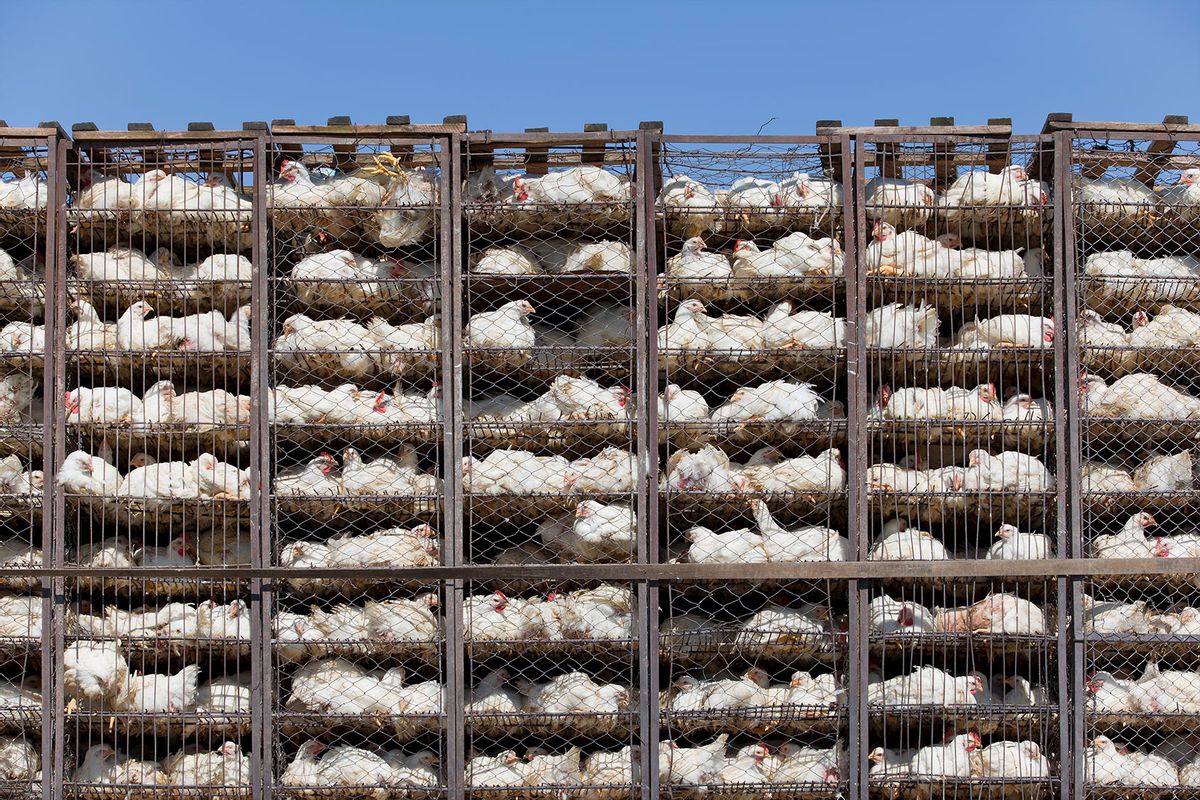Earlier this October, the U.S. Supreme Court heard oral arguments in the case of the National Pork Producers Council vs. Ross. The court's ruling will determine if a recent California law that sets minimum animal welfare standards for pigs and chickens should be upheld. Because the law stipulates that all pork sold in California must meet the state's production standards, it has the attention of the pork industry nationwide, which has largely refused to comply with the new standards. They have taken the case all the way to the Supreme Court in the hope that they'll be overturned. But the ruling could ultimately have implications beyond animal welfare concerns, potentially undermining a legislative method that progressive interest groups have used to bring reform to numerous industries nationwide.
What is Proposition 12?
Proposition 12 went before California voters in 2018 as a measure that would tighten up earlier legislation regarding animal welfare on factory farms. Voters overwhelmingly approved the measure, with 62% of voters in favor. Earlier attempts by California to eliminate unnecessary confinement for sows and hens had been somewhat successful in improving animal welfare on farms, but left significant loopholes. While the egg industry — even those companies outside California — has mostly complied with these requirements to raise animal welfare standards, the pork industry hasn't, and meat brought into the state largely doesn't meet California's standards. With this in mind, Prop 12 specified that, not only must these standards be met by products made in California, all pork and eggs sold in the state must meet those same production standards.
While Prop 12 does address some other animal welfare concerns, like adjusting space requirements for egg-laying hens, the most contentious point is the pork industry's use of gestation crates. Pregnant sows can be territorial and hierarchical, and especially in the cramped conditions of a factory farm, this can quickly turn into aggression that might cause the sows to lose piglets, be seriously injured or even die. If you assume (as the profit-motivated pork industry does) that the tightly packed conditions on factory farms are necessary, keeping sows away from each other seems like the most convenient way to avoid that problem.
But the reality of gestation crates is grim: Without room to even turn around, sows are kept in confinement for months, only to be moved to even more restrictive farrowing crates (which Prop 12 doesn't even address) after they give birth.
The pork industry presents gestation crates as a necessary evil that's ultimately better for the pigs than letting them hurt one another. But as we explore in our podcast, it doesn't have to be this way: As intelligent, social animals, pigs' behavior changes with their environment. When pigs learn to interact with each other in the cramped, exclusionary environment of a factory farm, violence is more likely. With ample space, deep bedding and the other factors they need to engage in their natural behaviors, that becomes far less of a concern. Providing those conditions would be a foundational change that flies in the face of the factory farm model, however, and the mainstream pork industry is correct that it would be an expensive one.
The case against Proposition 12
Notably, Prop 12 doesn't even mandate a full transition away from confinement; it simply increases the amount of space required per pig such that they can move around a little rather than only standing or laying down. Still, the industry considered it to be enough of an imposition on their production model that they refused to comply, dragging out several legal challenges against the California Department of Food and Agriculture and delaying the implementation of the standards that were supposed to be in place at the beginning of 2022. The most successful of those challenges, the National Pork Producers Council (NPPC) vs. Ross (California's Secretary of Agriculture), went before the U.S. Supreme Court in early October.
Animal welfare is certainly Prop 12's main concern, but whether or not it's good for animals isn't what brings it before the Supreme Court. In this case, the NPPC argues that because most pork sold in California comes from outside the state, the law overreaches beyond California's borders to regulate interstate commerce. This is a power reserved by the Federal government in the Constitution.
This is hardly the first case of California policies shaping industries beyond its borders: Nationwide, everything from automotive emission standards to carcinogen disclosures on household goods are designed to fit California's standards, and it's a significant route for progressive regulation on the environment and other issues to gain a national foothold even when support is limited. If the court decides to side with the NPPC, this strategy might become unviable in the future.
Accordingly, this means that industries beyond agriculture have watched the Prop 12 case closely in the hopes of overturning it. In the interest of that outcome, pharmaceutical companies, anti-regulation conservative political think tanks and others have filed amicus, or "friend of the court," briefs, which outline how this issue affects them.
What happens next?
Given some of the court's recent decisions, there's plenty of reason to be concerned they might overturn Prop 12. Last year, the Court issued a ruling against the EPA, limiting their ability to regulate carbon emissions under the clean air act. In that case, the court's rationale was that only the legislature could set these standards, making it much more difficult for current and future administrations to take action on the environment without hard-to-find support from Congress.
But the rationale for that earlier decision — that these issues should be decided by the public's representatives in the legislature rather than by executives — would make overturning Prop 12 an ironic choice: While the industry portrays the situation as a bunch of out-of-touch animal rights activists trying to change a system they don't understand in a place they don't live, the reality is that Prop 12 won a wide majority of the vote in the country's most populated state. Even if the court finds the policy does exert too much control on other states, the fact remains that it was a decision reached through popular referendum, one of the most difficult uphill slogs in politics. That alone is reason for the industry to be scared, and for them to be a little smarter: as the public gets more educated about factory farming, it's unlikely that this will be the last attempt to challenge the system.
It didn't have to be this way; pork producers could have followed the adaptations made by egg producers. After aggressively fighting California's cage free mandate ten years ago, they ultimately realized public demand for more humanely produced eggs wasn't going away. In the subsequent decade, the number of cage free eggs has risen sharply from 4% in 2010 to 29% in 2021.
This doesn't mean that the changes would come easily or without a fight: Eggs are a more localized industry than pork, which has accumulated more power recently through consolidation and expanding export markets. But the idea that Americans really love and need cheap pork is increasingly questionable: as we explore in our podcast episode on the pork industry, the seemingly organic "put bacon on everything" trend of the early 2000s was actually the product of clever marketing. And while the industry might be warning of pork shortages and high prices if laws like Prop 12 go into place, we know that they've used that line before, most notably when meat plants closed during the pandemic, and that a meat shortage is pretty unlikely.
Even if the court strikes it down, Prop 12 won't be the last attempt to reform factory farms. But it doesn't have to spell disaster: The reforms it proposed do not bring foundational change to a production system that's cruel to animals from birth to death. With the advocacy that surrounded the referendum, voters were brought up to speed on what factory farm life looks like for animals and they didn't like what they saw. Now, with popular support behind animal welfare improvements, companies will have to shift their practices over time, one way or another, to meet consumer demands.




Shares